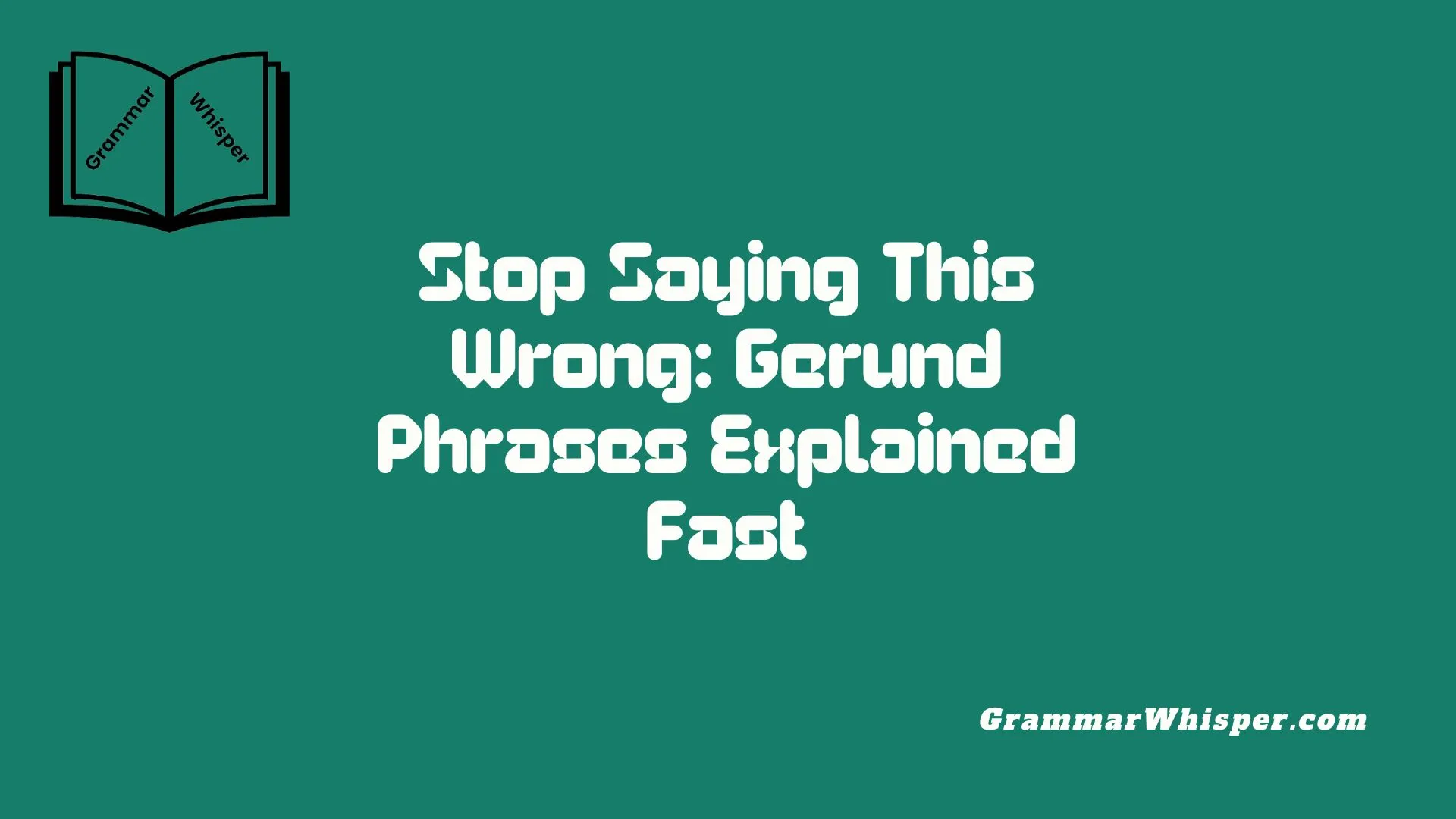When I began learning English, I struggled to connect ideas in longer sentences without sounding a bit off. Everything changed once I discovered gerund phrases – they’re more than just a quirky piece of grammar. These compact, powerful tools allow you to express complex actions and thoughts clearly. Whether you’re writing essays, replying to emails, or building web content, learning how to use gerund phrases can instantly elevate your tone and make your language polished and professional.
A gerund is simply a verb acting as a noun, but pair it with other words and it forms a phrase that’s surprisingly flexible. These phrases can appear naturally in any sentence, helping it sound natural without effort. What’s even more impressive? They blend into your work so seamlessly that you can say more with fewer words. Over time, your understanding of how they function will grow – this guide dives deep into their structure, why they matter, and how they help you write more fluent and confident English.
What Exactly Is a Gerund Phrase? (Definition + Overview)
A gerund phrase is a group of words that begins with a gerund – a verb ending in -ing that functions as a noun – and includes any objects, modifiers, or complementary words associated with it.
🧠 Definition: A gerund phrase is a phrase consisting of a gerund, its object, and any modifiers, all working together as a noun in a sentence.
Example:
✅ Running a marathon requires training. – Here, “Running a marathon” is the gerund phrase and acts as the subject.
Quick Breakdown
| Element | Example |
| Gerund (verb + -ing) | running |
| Object | a marathon |
| Modifier (optional) | quickly, for charity, etc. |
So, a gerund phrase functions like a noun, even though it includes what looks like a verb.
Why Gerund Phrases Matter in English Grammar
Gerund phrases are not just grammar trivia – they’re essential for:
- Adding depth to your writing
- Making concise yet descriptive statements
- Avoiding repetitive sentence structures
Why Writers Use Gerund Phrases
- To create fluid, more elegant sentence constructions
- To express activities, behaviors, or actions as things
- To simplify ideas that would otherwise need a whole clause
✍️ “Mastering gerund phrases helps you write smarter, not harder.”
Gerund Phrase vs. Present Participle Phrase
This is where many learners (and even native speakers) stumble. Both gerunds and present participles end in -ing, but they function very differently.
Comparison Table
| Feature | Gerund Phrase | Present Participle Phrase |
| Acts as… | Noun | Adjective |
| Role in sentence | Subject, object, or complement | Describes a noun |
| Example | Eating too fast is bad. | The man eating too fast is choking. |
| Can be replaced with noun? | Yes | No |
💡 Tip: If the phrase can be replaced with a noun (like “that activity”), it’s probably a gerund phrase.
The Structure of a Gerund Phrase (What It’s Made Of)
Every gerund phrase starts with a gerund and includes words that complete or describe it.
Typical Components
- The gerund (verb + -ing)
- Direct objects (if the verb is transitive)
- Modifiers (adverbs, adjectives, prepositional phrases)
Example:
Driving a car in heavy traffic stresses me out.
Breakdown:
- Gerund: driving
- Object: a car
- Modifier: in heavy traffic
Visual Diagram
plaintext
CopyEdit
[ Driving [ a car [ in heavy traffic ] ] ]
|– Gerund –|– Object –|– Modifier –|
How to Identify a Gerund Phrase in Any Sentence
Here’s a step-by-step method for spotting gerund phrases in real writing.
Steps to Identify
- Find the -ing word in the sentence.
- Check if it’s acting as a noun.
- Look for any words attached to it: objects or modifiers.
- Ask: can the whole phrase be replaced with “that activity”?
Example Sentences
Swimming in the ocean calms her. “That activity calms her” → ✅ it’s a gerund phrase.
She enjoys baking cookies on weekends. “She enjoys that activity” → ✅ again, gerund phrase.
Practice Tip
If the phrase doesn’t describe a noun, but acts as a noun, it’s a gerund phrase.
Key Functions of Gerund Phrases in Sentences
Let’s explore the five grammatical roles gerund phrases commonly play in English.
As a Subject
Reading historical novels fascinates me.
As a Direct Object
I enjoy riding horses on the beach.
As a Subject Complement (Predicate Nominative)
My favorite hobby is collecting vintage coins.
As an Object of a Preposition
She’s passionate about solving complex equations.
As an Appositive
His job, writing ad copy, requires creativity.
Summary Table of Gerund Phrase Functions
| Function | Example |
| Subject | Playing soccer is fun. |
| Direct Object | He loves painting landscapes. |
| Subject Complement | Her passion is teaching math. |
| Object of Preposition | She’s skilled at designing websites. |
| Appositive | His goal, winning the race, is in reach. |
Real-Life Examples of Gerund Phrases in Everyday English
You don’t need to look far to find gerund phrases – they’re everywhere.
In Conversations
- “I’m thinking about going to Italy this summer.”
- “Working late is starting to drain me.”
In News Headlines
- “Raising children during a pandemic: The new challenges”
- “Cutting costs while maintaining quality: Is it possible?”
In Business Writing
- “We recommend outsourcing non-core functions to improve efficiency.”
- “The key to success is building strong relationships.”
How Gerund Phrases Add Style, Clarity & Rhythm to Your Writing
Well-used gerund phrases can transform your writing:
What They Do
- Add variety to sentence starters
- Reduce wordiness
- Improve sentence rhythm
Make your writing feel more natural
Before vs. After Examples
| Without Gerund Phrase | With Gerund Phrase |
| She was frustrated because she had to wait. | Waiting in line frustrated her. |
| He explained how he learned French. | Learning French took time and practice. |
Quote
“Grammar is the logic of speech, even as logic is the grammar of reason.” – Richard C. Trench
Common Mistakes and Misunderstandings with Gerund Phrases
Many mistakes come from misidentifying or misplacing gerund phrases.
Top Errors
- ❌ Using commas where they don’t belong Incorrect: I like, baking cakes. ✅ Correct: I like baking cakes.
- ❌ Mixing up with participle phrases “The barking dog” = present participle (modifies a noun) “Barking loudly annoyed the neighbors” = gerund phrase
- ❌ Forgetting subject-verb agreement Running a business require time. → ❌ Running a business requires time. → ✅
Quick Tips for Using Gerund Phrases Effectively
Here are expert-level tips to make sure you nail it every time:
- ✅ Use gerund phrases to summarize complex actions
- ✅ Don’t separate the gerund from its object with a comma
- ✅ Make sure the phrase functions as a noun
- ✅ Keep it tight – don’t overload with modifiers
- ✅ Use gerund phrases to vary sentence beginnings
Mini Test: Can You Spot the Gerund Phrase?
See if you can identify the gerund phrase in each sentence:
Practice Questions
- Jogging early in the morning boosts my energy.
- She avoided talking about politics.
- His favorite hobby is collecting rare coins.
- We discussed moving to a bigger house.
- Fixing the car took all day.
Answers
- Jogging early in the morning
- talking about politics
- collecting rare coins
- moving to a bigger house
- Fixing the car
Conclusion
Gerund phrases are more than grammar – they’re tools of style, structure, and clarity. By understanding and using them confidently, you:
- Write more clearly
- Communicate ideas more efficiently
- Impress readers with smooth, polished prose
Mastering gerund phrases unlocks a new level of control in your writing. Keep practicing, and you’ll start spotting them everywhere – in conversations, in books, and in your own drafts.
“The difference between the almost right word and the right word is the difference between the lightning bug and the lightning.” – Mark Twain
FAQs
What’s the difference between a gerund phrase and an infinitive phrase?
A gerund phrase starts with a verb ending in -ing and acts as a noun. An infinitive phrase starts with to + base verb and can act as a noun, adjective, or adverb.
Can a gerund phrase be passive?
Yes. For example: “Being ignored by the team was frustrating.” It’s a gerund phrase using the passive voice.
Are gerund phrases common in formal writing?
Yes, especially in academic, business, and legal writing, where clarity and conciseness are key.
Is “running late” a gerund phrase?
It depends on the use. In “I hate running late,” yes – gerund phrase. But “He is running late” uses running as a present participle.











